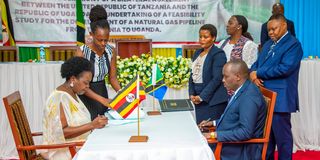Tanzania and Uganda sign gas pipeline deal

Deputy Prime Minister Doto Biteko and Uganda's Minister of Energy and Mineral Development, Ruth Nankabirwa (left), signing a bilateral Agreement between Tanzania and Uganda in the implementation of the Construction of the Natural Gas Pipeline Project from Tanzania to Uganda.
Dodoma. Tanzania and Uganda signed a bilateral agreement on Thursday, November 9, to construct a natural gas pipeline that will boost energy security and economic growth in both countries.
The pipeline will transport natural gas from Tanzania's southern regions to Uganda, where it will be used to power factories and generate electricity. The project is also expected to create jobs and attract foreign investment.
The agreement was signed on behalf of Tanzania by Deputy Prime Minister Doto Biteko and Uganda by Minister of Energy and Mineral Development, Ruth Nankabirwa.
Speaking at the signing ceremony, Biteko said the project will increase the demand for natural gas and boost gas extraction in Tanzania's Lindi and Mtwara regions. He also said that Kenya and Botswana have expressed interest in Tanzania's natural gas.
Biteko urged investors to come and invest in the natural gas sector, noting that gas processing has reached 250 million cubic feet per day, with 80% used for electricity generation and 20% for industrial, household, and transportation use.
Biteko said that the agreement is based on a Memorandum of Understanding (MoU) signed by the two countries in August 2018, and that the two countries will work together on a feasibility study to assess the project's design, gas demand, pipeline size, and other important factors.
Biteko also noted that Tanzania has discovered large quantities of natural gas, approximately 57.54 trillion cubic feet, and that the government is continuing to explore for new sources in areas such as Eyasi Wembere, Mnazi Bay North, Songosongo West, Lake Tanganyika, and the deep sea.
Minister Nankabirwa of Uganda said that her country recognizes the importance of the project and is committed to its acceleration. She urged the joint implementation committee to expedite the procurement process for the lead consultant and the feasibility study.
Nankabirwa also noted that the two countries have a history of collaboration on energy projects, such as the 14-megawatt Kikagati hydropower project, the Masaka Mutukula to Mwanza power transmission project, and the East African Crude Oil Pipeline (EACOP) project.
The Tanzania-Uganda gas pipeline project is a significant milestone in East Africa's energy integration efforts. It will help to boost energy security and economic growth in both countries, and it will create jobs and attract foreign investment.
Tanzania and Uganda sign gas pipeline deal
Tanzania and Uganda signed a bilateral agreement on Thursday, November 9, to construct a natural gas pipeline that will boost energy security and economic growth in both countries.
The pipeline will transport natural gas from Tanzania's southern regions to Uganda, where it will be used to power factories and generate electricity. The project is also expected to create jobs and attract foreign investment.
The agreement was signed on behalf of Tanzania by Deputy Prime Minister Doto Biteko and Uganda by Minister of Energy and Mineral Development, Ruth Nankabirwa.
Speaking at the signing ceremony, Biteko said the project will increase the demand for natural gas and boost gas extraction in Tanzania's Lindi and Mtwara regions. He also said that Kenya and Botswana have expressed interest in Tanzania's natural gas.
Biteko urged investors to come and invest in the natural gas sector, noting that gas processing has reached 250 million cubic feet per day, with 80% used for electricity generation and 20% for industrial, household, and transportation use.
Biteko said that the agreement is based on a Memorandum of Understanding (MoU) signed by the two countries in August 2018, and that the two countries will work together on a feasibility study to assess the project's design, gas demand, pipeline size, and other important factors.
Biteko also noted that Tanzania has discovered large quantities of natural gas, approximately 57.54 trillion cubic feet, and that the government is continuing to explore for new sources in areas such as Eyasi Wembere, Mnazi Bay North, Songosongo West, Lake Tanganyika, and the deep sea.
Minister Nankabirwa of Uganda said that her country recognizes the importance of the project and is committed to its acceleration. She urged the joint implementation committee to expedite the procurement process for the lead consultant and the feasibility study.
Nankabirwa also noted that the two countries have a history of collaboration on energy projects, such as the 14-megawatt Kikagati hydropower project, the Masaka Mutukula to Mwanza power transmission project, and the East African Crude Oil Pipeline (EACOP) project.
The Tanzania-Uganda gas pipeline project is a significant milestone in East Africa's energy integration efforts. It will help to boost energy security and economic growth in both countries, and it will create jobs and attract foreign investment.




